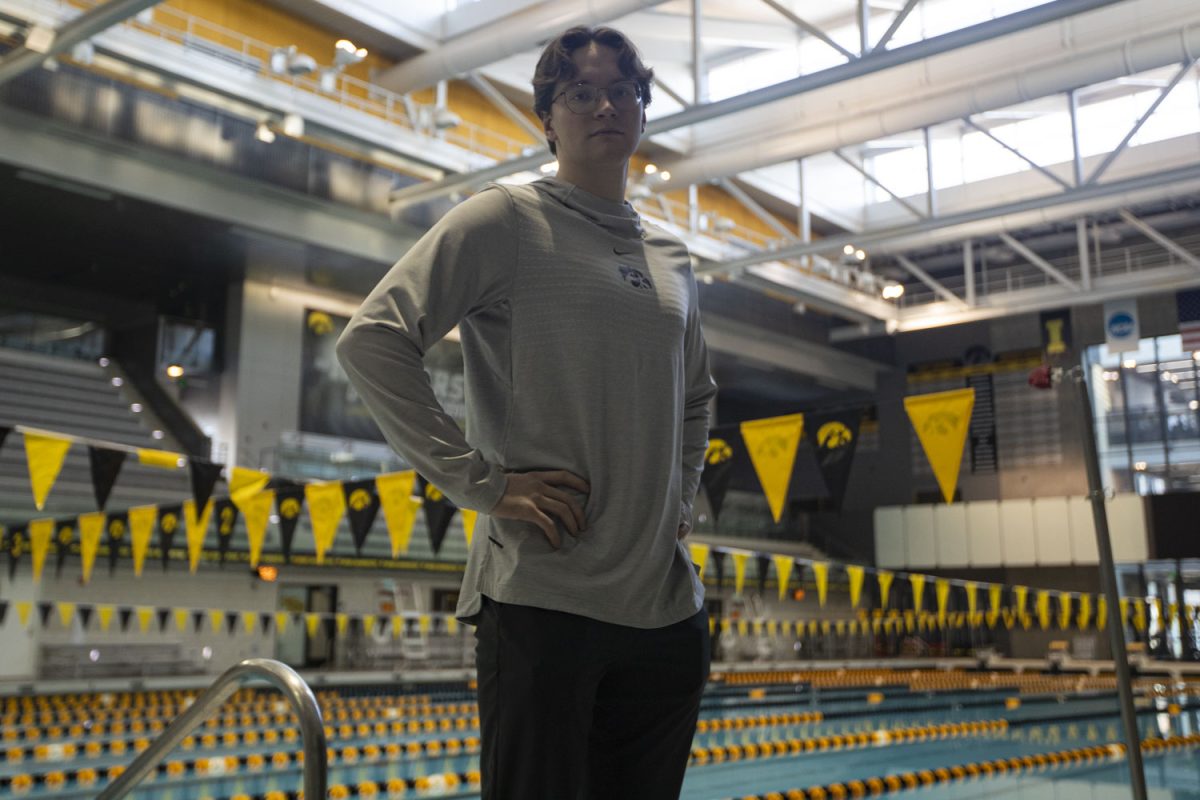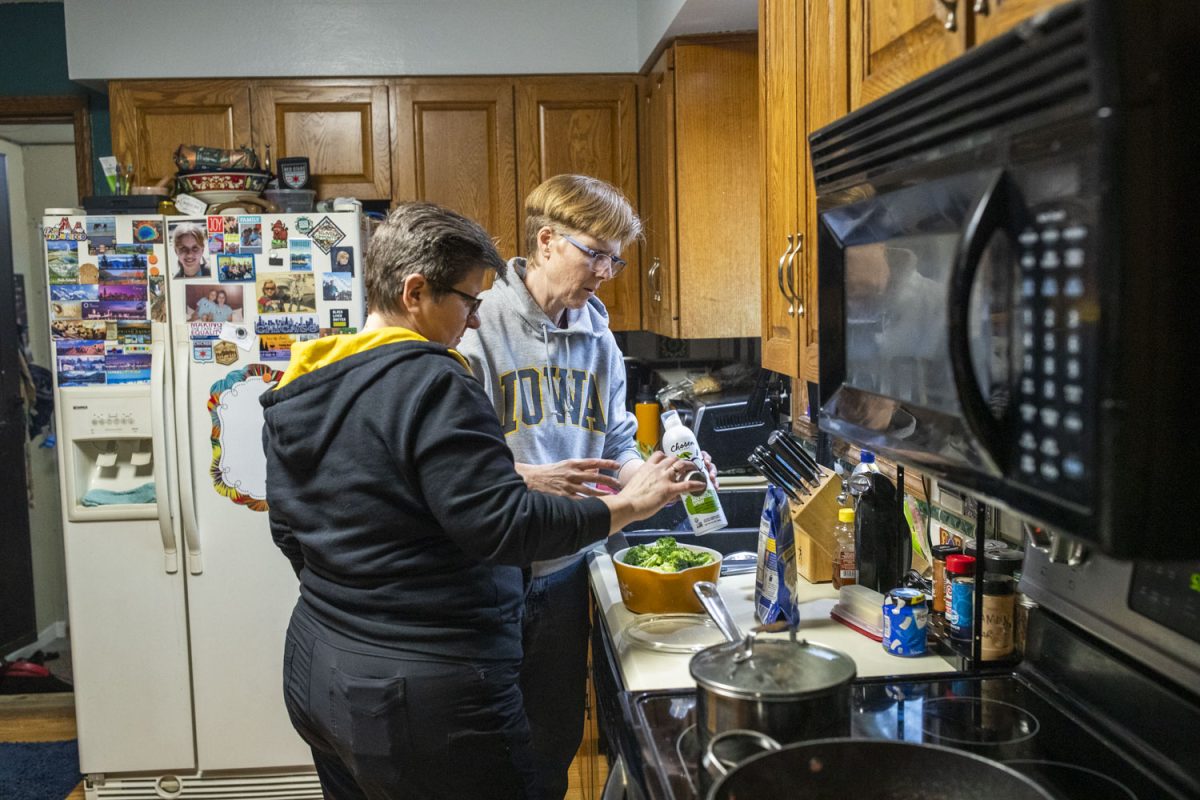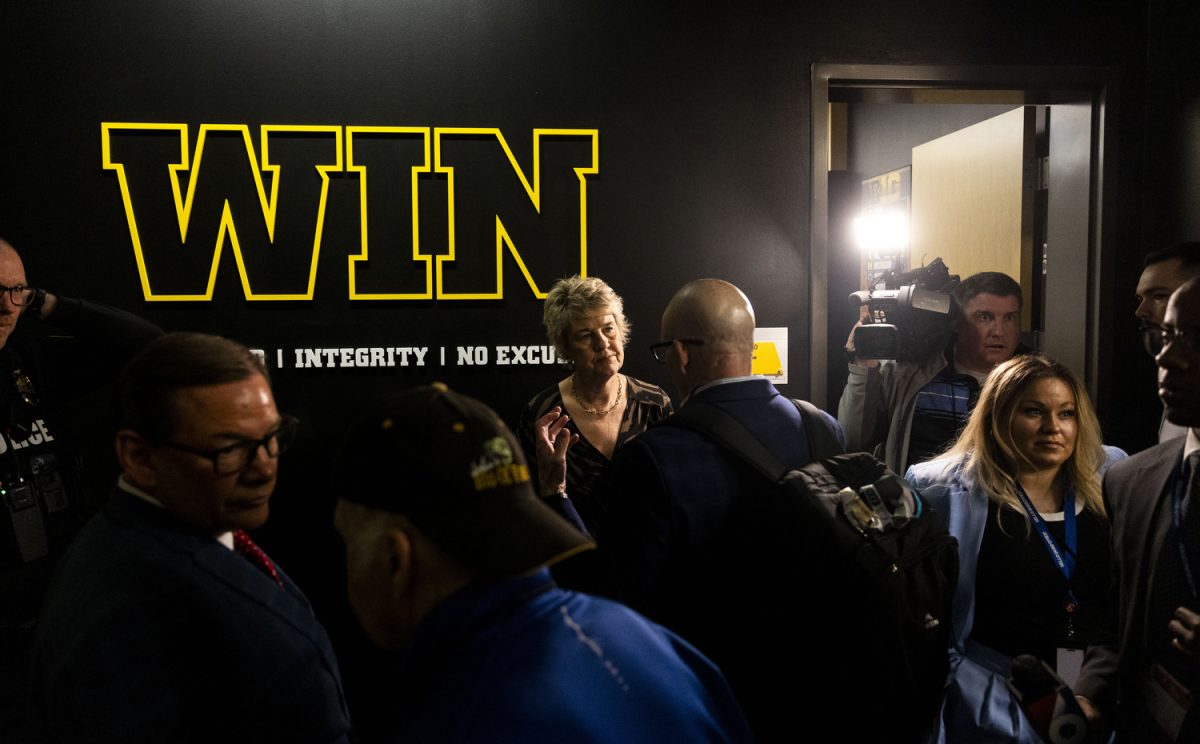Four years have passed since former University of Iowa athletics director Gary Barta announced that University of Iowa Athletics would cut four varsity sports. The Daily Iowan has spent the past several months tracking down the student-athletes whose NCAA careers were forced to move elsewhere or were stopped altogether. The following story is the third of a four-part series documenting the lives of some of these athletes since that point.
Beneath the beaming sunshine in Orlando, Florida, the Iowa men’s tennis team played out its final match before the program went dark. Representing the Hawkeyes in the 2021 NCAA Championships that May afternoon were Oliver Okonkwo and Will Davies, the first Iowa doubles pairing to qualify in over three decades. They were also the last.
Dashing across the blue-toned, hardcourt surface, the 17th-ranked Okonkwo and Davies battled the third-ranked duo of William Blumberg and Brian Cernoch from North Carolina, falling in straight sets. When the final point was awarded to the Tar Heels, Okonkwo and Davies embraced, savoring the poignant culmination of three years as teammates.
“I was gutted,” Okonkwo recalled. “I had a lot of friends watching the match, and a lot reached out to me. I don’t think I responded to anyone for two days. It was an emotional time.”
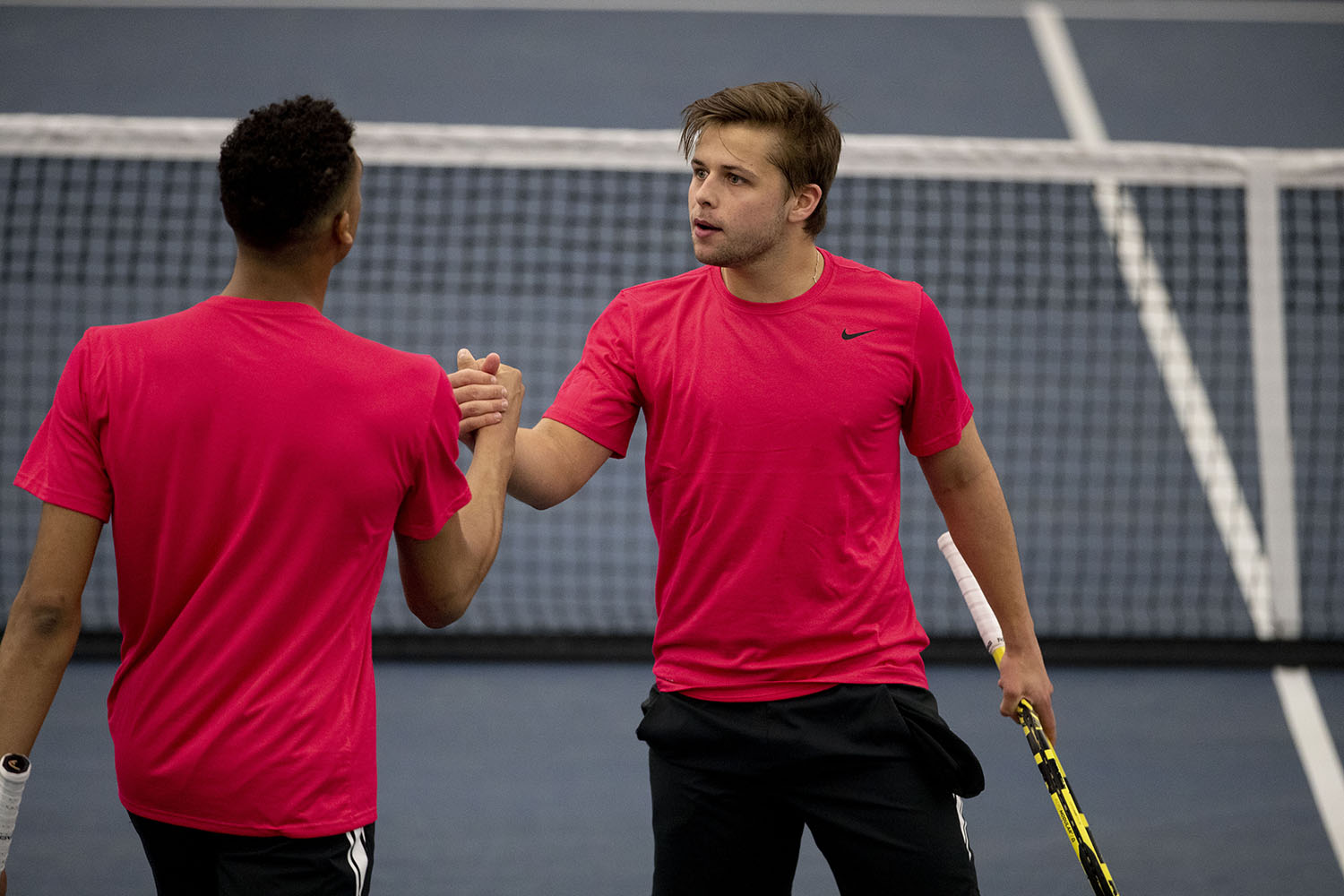
After taking a photo with their coaches, the pair laid down a uniform at the court’s baseline, marking the final pin in their journey with the Hawkeyes. The English-born players traveled across the Atlantic to play for Iowa. In the coming months, Okonkwo and Davies would hit the road again, embarking on separate paths to different careers.
While the former takes on the professional ranks, the latter coaches the men’s team at the University of Denver. However, neither forgot the bond they forged and the progress they made during their time in the Black and Gold, where they adhered to former head coach Ross Wilson’s philosophy: team before all else.
“We had a brotherhood. Those guys are my closest friends,” Okonkwo said. “It was like a ‘last dance’ kind of thing. We were coming off the best season we ever had … but we’re playing for a school that doesn’t really want us.”
From players to teammates to advocates
Before Barta’s announcement and before the team reached No. 20 nationally in 2019-20, Okonkwo and Davies were two teenagers from England looking to make a name for themselves, hailing from Berkshire and Norwich, respectively. Okonkwo had never been to the U.S., while Davies was only stateside for a tournament in Miami. Both held a racket in their hand before they hit double-digits in age, and their training was paying off.
Wilson scouted both players overseas and was complimentary of Davies’ hands and motor. For Okonkwo, Wilson was blown away by the strength and speed of his 6-foot-3 frame but also noted Okonkwo’s cheerful smile. Okonkwo wasn’t a “polished player” at the time, but Wilson couldn’t ignore his potential.
Likewise, neither player could take their eyes off the allure of Iowa’s campus. Davies remembered strangers stopping to say hello on his visit, and Okonkwo was amazed by the facilities at the Hawkeye Tennis and Recreation Center. Davies arrived a year before his teammate, and Wilson cast the pair as doubles partners in the fall of 2018.
Davies and Okonkwo were an instant success, winning five matches and advancing to the finals of the Big Ten Championships that semester. When the calendar flipped to 2019, the tandem went 16-5 and was ranked as high as No. 58 nationally.
“Whenever [Oliver] hit the ball, I would always be able to react and put that nice shot away,” Davies said. “But I just think, more importantly, we had fun together. We were very bubbly characters on the court and liked to pump it up.”
“They didn’t win a point that you didn’t hear about,” Wilson added. “They were trying to create momentum on the other courts by doing that.”
But Davies and Okonkwo’s bond was more than synergy. According to Wilson, Davies proved a comforting presence and mentor for Okonkwo, who was sometimes too critical of himself during matches.
“There were times when Oliver would get down on himself and would be muttering to himself for being frustrated,” he said. “And Willie would be, like, ‘Let’s take a couple of seconds here, let’s focus on what we’re trying to do.’ I always felt like Will was a second coach out on the court.”
Indeed, Davies’ teachings proved valuable for Okonkwo, but the now- 24-year-old said he developed much of his discipline from Wilson and the rest of the coaching staff, who wouldn’t tolerate any laziness or selfish play in practice.
“The second day, they were on my ass, saying, ‘We don’t do this, we’re a team here. This is the routine … this is how we hold ourselves accountable,’” Okonkwo said.
Back in Europe, tennis is mainly an individual endeavor, Okonkwo said. But the unfamiliarity with American collegiate tennis, where “people are willing to cut off an arm and a limb to win a match,” rubbed off quickly. By the time he hit his third season, this shift was tested in dramatic fashion.
For Wilson, the team’s 2020-21 season “wasn’t about winning tennis matches.” With the program’s fate seemingly set in stone, the head coach was focused on ensuring each of his athletes had future plans and assisted in the transfer process.
Davies entered the portal just weeks after Barta’s announcement and signed with the University of San Diego. Okonkwo initially tried to go to Illinois, but “things didn’t work out” between the two parties. By the time October rolled around, he not only didn’t know where he would play next season but if he would be healthy enough to do so.
While playing in a singles tournament earlier that month, Okonkwo felt a surge of pain in his right knee. An MRI scan later revealed cartilage damage and deterioration. After an initial procedure, doctors told him the injured part of his knee would have to be surgically replaced. He could either choose to undergo the operation then or wait until the summer, extending his recovery time further into the following season.
To Okonkwo, playing on “half a knee” for the spring season wasn’t a difficult decision. His actions didn’t surprise Wilson, either. In his seven years at the helm in Iowa City, the coach built his program on the pillar of selflessness.
“[The team] knew it was so important to play for each other … a big thing on our team was that you leave the program better than you found it. I think a lot of people try to say that but I think you see that in the results of our program and guys really did live that,” Wilson said. “If you were sick or hurt but the team needed you to play, it was the mentality that you sucked it up and got it done.”
Although multiple Hawkeyes entered the portal that season, all but one opted to play out the 2020-21 season. At the squad’s first home match of the spring season on Feb. 21, Iowa ditched its traditional uniforms in favor of red Nike shirts, which they donned the rest of the season.
While the wardrobe swap was simple to accomplish — a player-funded purchase from Dick’s Sporting Goods — the bright shirts were a conspicuous rallying cry against the athletic department’s decision.
“A lot of us were quite offended, to be honest;I was as well,” Okonkwo said. “They didn’t want us to be a part of their athletic department anymore, so why should we wear the [school] colors when we don’t feel supported by the athletic department?”
Okonkwo said the team allegedly had civil conversations with athletic department representatives, but the squad didn’t budge in its stance. Donning the Tigerhawk-less uniforms, Davies and Okonkwo sliced their way through the competition, winning their first eight doubles matches and ascending to the No. 2 pair in the country, but the scorching success went cold in Orlando.
After the duo and Wilson flew back to Iowa, they rejoined the rest of the team for one final dinner in downtown Iowa City. Once the plates were cleared and players pushed in their chairs to depart, Wilson began to realize that what took years to build was now splintering into pieces.
“That’s when it hit me pretty hard, like, ‘Oh, f***, this is over,’” he said. “We’re never going to be the team that I put together, the guys that I know, got to train, got to be with. That was a tough dinner.”
Restarting careers, hundreds of miles apart
On Jan. 21, 2022, Davies and Okonkwo were in polar opposite situations. Basking in the warm southern California sunshine, Davies earned a singles and doubles triumph in his first matches with San Diego.
More than 1,800 miles away, Okonkwo braved the bitter chill of an Iowa winter, rehabbing from surgery and completing his degree. That November, he committed to play at Illinois the next season.
“I didn’t go to all the [women’s matches], because it was tough, that’s what we used to do,” Okonkwo said. “I didn’t go to a lot of sporting events that year, to be honest. It was tough to support.”
Okonkwo’s comeback trial was far from smooth. Still not as agile as he was that spring, he stood stationary, returning hundreds of balls during training sessions with Iowa teammate Kareem Allaf. Yet those practice reps were far from actual competition. In one of his first tournaments for Illinois in the fall of 2022, Okonkwo remembered some “bloody awful” matches, where it felt as if he was back at square one all over again.
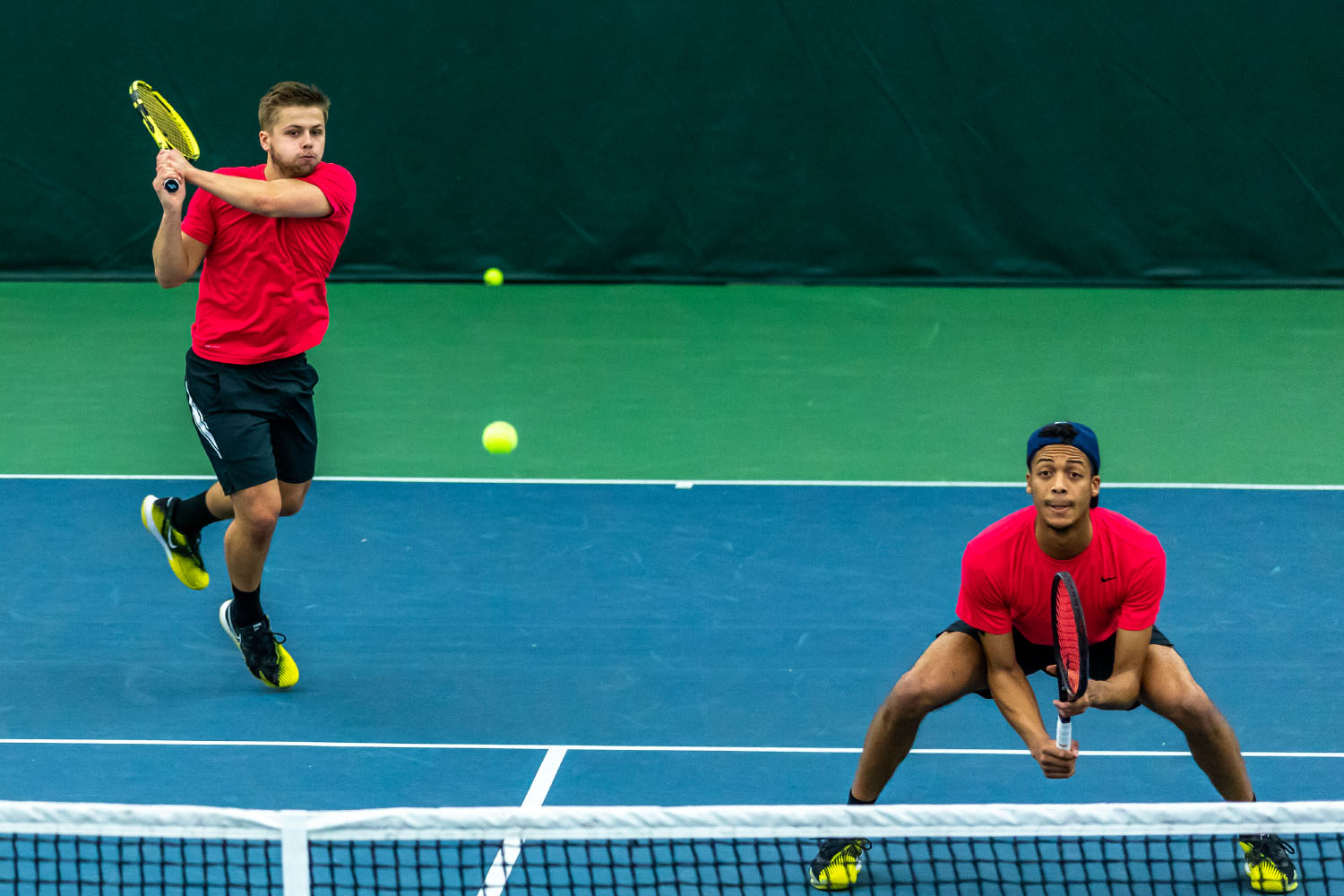
“I remember calling my mom up after the match, being, like, ‘I don’t think I can do it,’” Okonkwo said. “I felt unbelievably uncomfortable on the court … For it to be like, ‘I don’t know if I can get back to the level that I was,’ it brought up a lot of anxieties.”
These internal battles couldn’t be met alone. Okonkwo credits several conversations with Illini head coach Brad Dancer where he “burst into tears” as he expressed his doubts and frustration. Dancer’s message was simple: trust the process, and positive results will emerge. And soon enough, Dancer’s promise manifested itself in the form of eight straight singles triumphs in February. As the weather warmed, so did Okonkwo’s play, as he went 3-1 against ranked opponents down the stretch.
Yet perhaps the most resonant moment of Okonkwo’s resurgence came in September when he accomplished a goal he’d been working towards since his sophomore year: winning a professional match. The win not only occurred on Illinois’ campus but also in front of Allaf and fellow Hawkeye teammate Nikita Snezhko.
“Having my [Iowa teammates] there, it was kind of full circle,” Okonkwo said, adding he will continue playing on the professional circuit this summer.
While Okonkwo ushered a resurgence to his tennis playing career, Davies underwent a rotation to a newfound coaching profession. After finishing his lone year out west with a 20-6 singles record, Davies pondered pursuing the pros but decided the endeavor was too expensive.
Instead, Davies had other plans. He described how Wilson inspired him to love collegiate tennis, and so when the time came that he could potentially leave the sport, Davies didn’t feel quite ready to let go. With Wilson and San Diego head coach Ryan Keckley’s recommendations, Davies landed the job as an assistant coach with Denver in 2022, helping guide the team to a regular-season conference title his first year on the sidelines.
From his mentorship of Okonkwo and his leadership presence back at Iowa, the transition from player to coach was only natural. Wilson explained how in an individual-based sport like tennis, Davies always had an inherent sense of what was best for the group.
“He’s very good at fostering relationships,” Wilson said of Davies. “Recruits and parents that would come in, he’d always be one of the first guys to go up, shake their hand, and talk with them.”
Davies joins Wilson in the assistant coaching ranks, as Wilson landed the position with Notre Dame’s men’s squad in July 2021. Despite the distance, the duo still found their way back to the Hawkeye State; Davies’ fiancee and Wilson’s wife both hail from Iowa, and Okonkwo is still dating the same woman he met on campus.
“It’s still a home away from home, and it will always be that for me,” Davies said.
When any of the trio does return to campus, they will most likely encounter students who were never aware the team had existed. Instead, Wilson, Okonkwo, Davies, and the rest of the squad are the physical embodiments of an athletic past that stays strong in the present.
“The memories that we created together over the four year: no one can ever take that away from us,” Davies said. “We’re a tight-knit group and hopefully will remain that way for many more years to come.”




